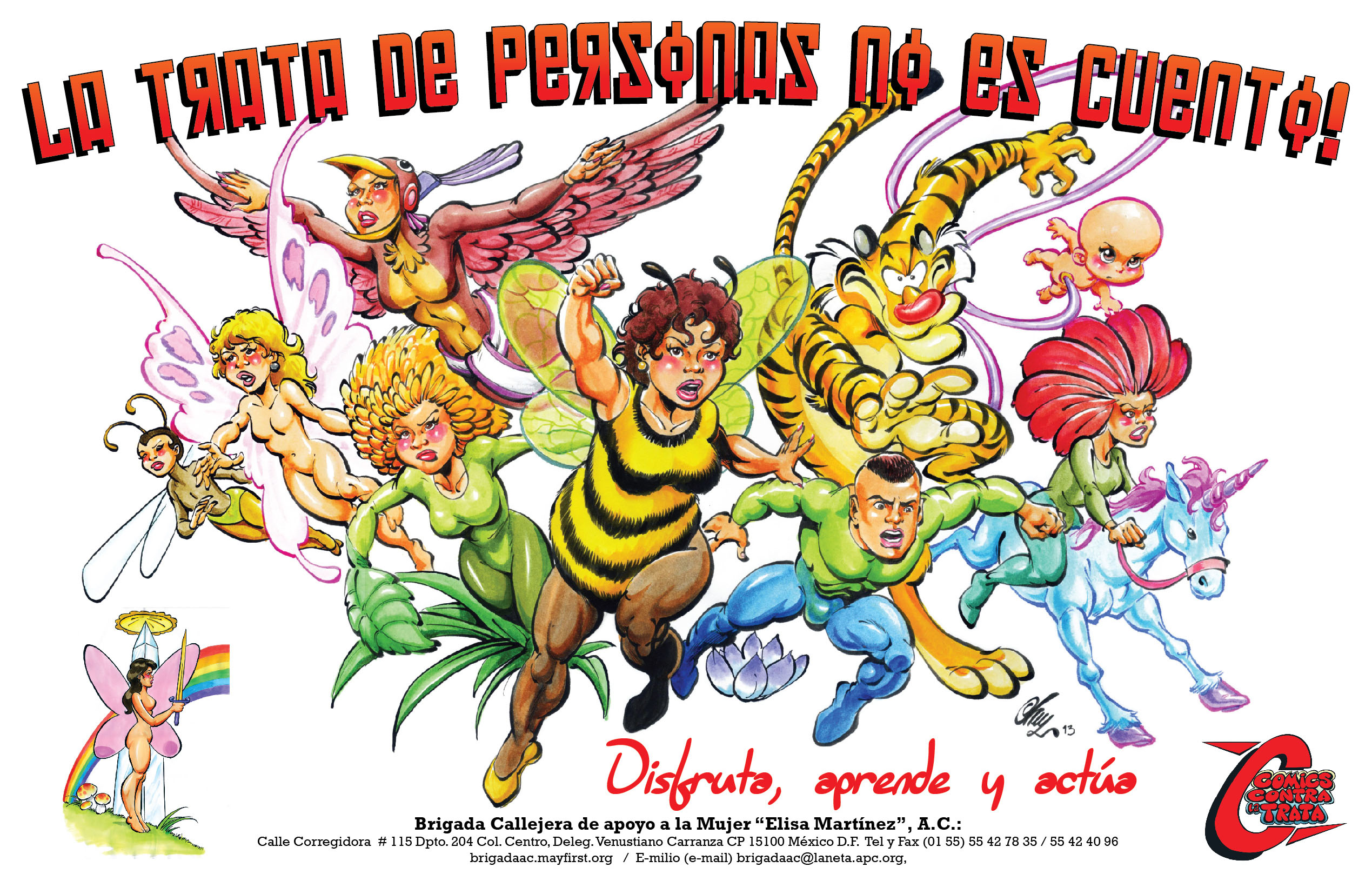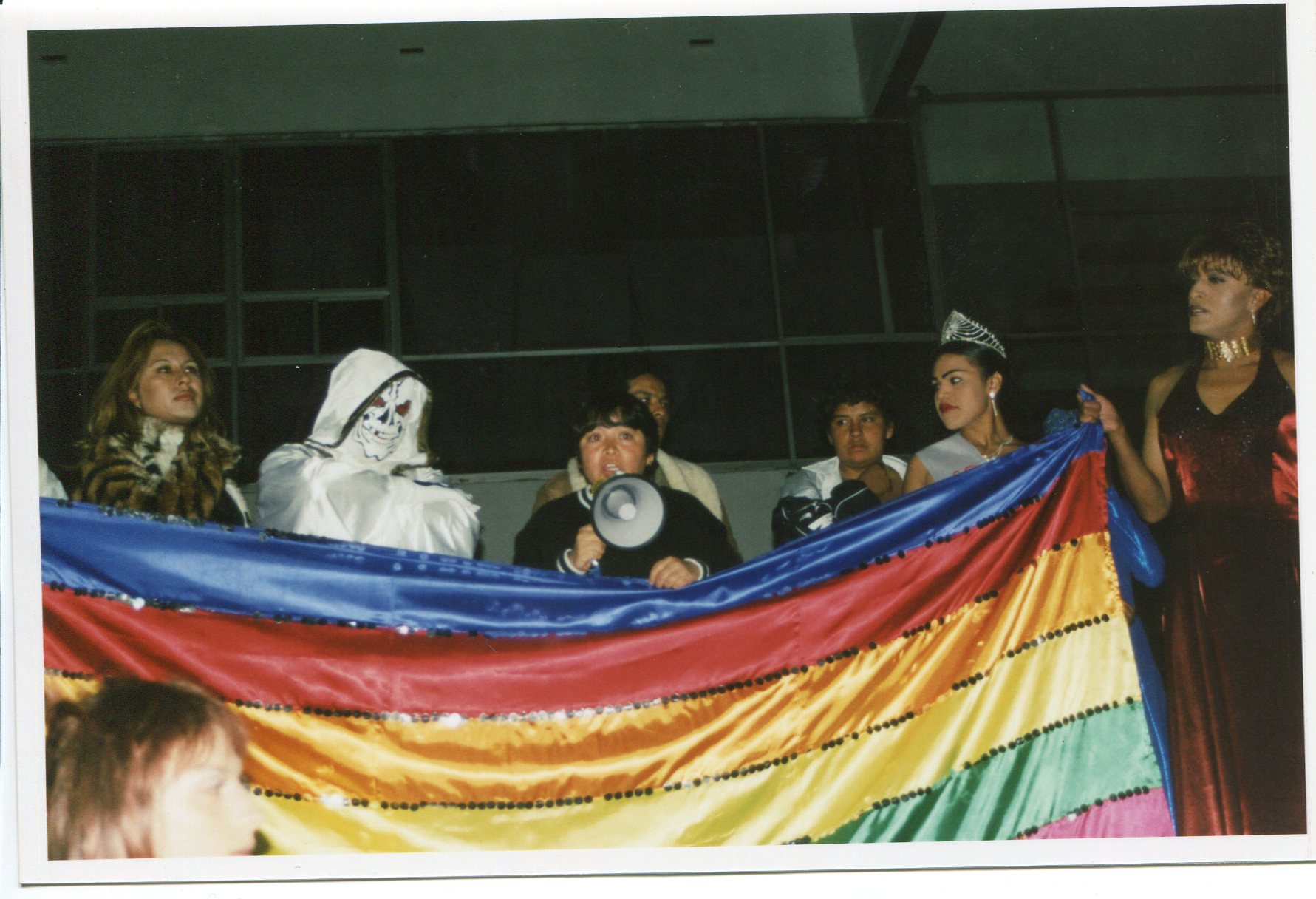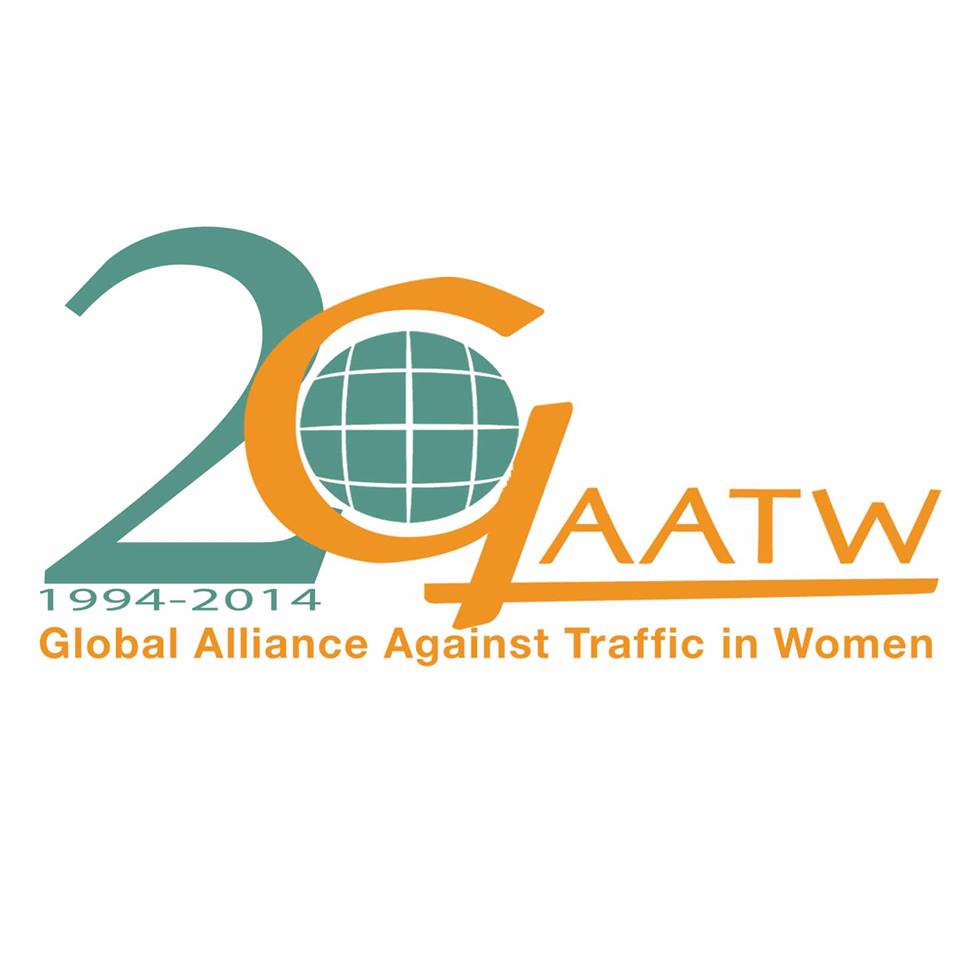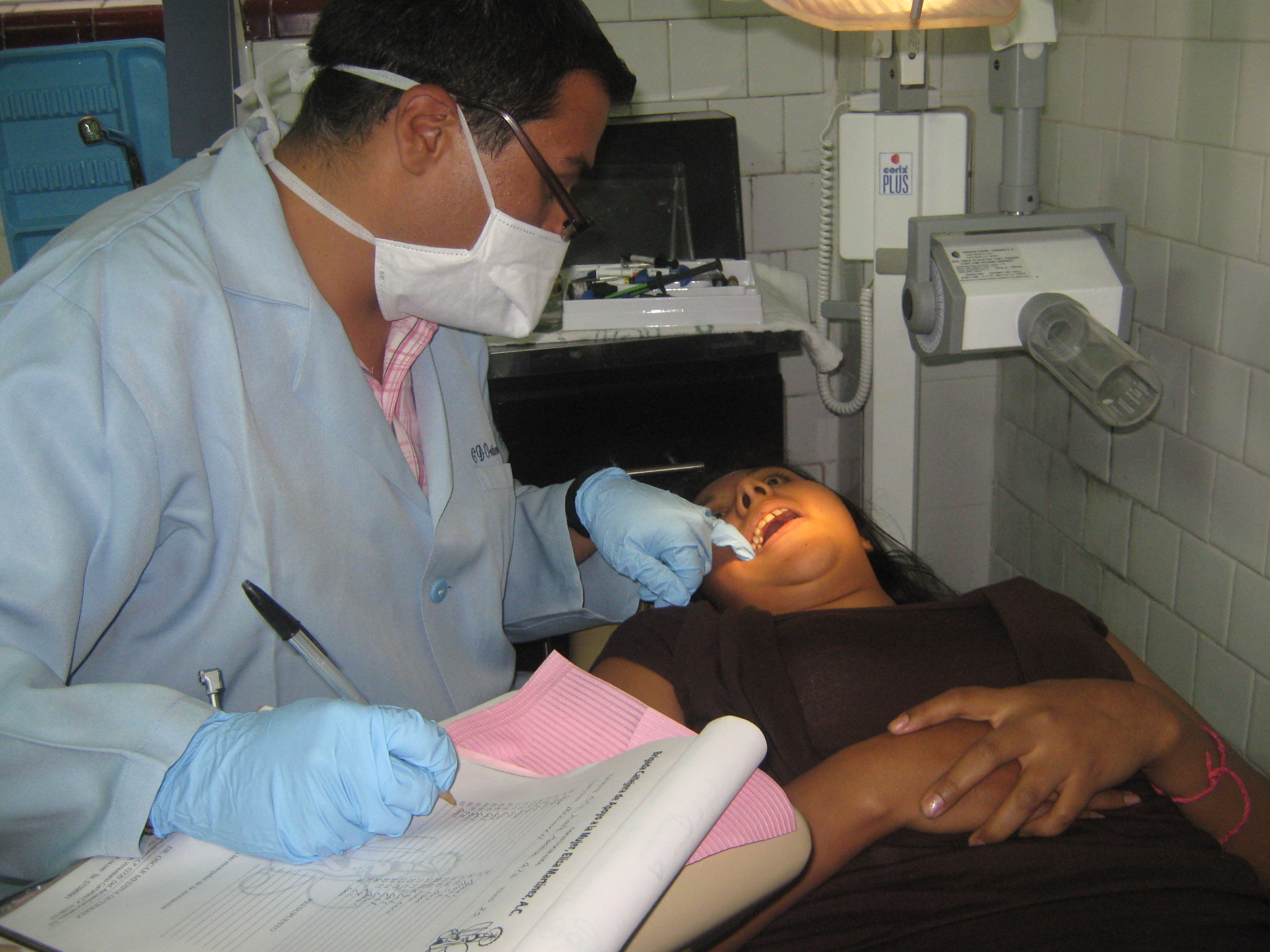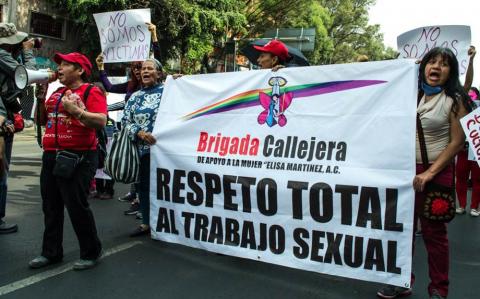
Sex workers organising for change
https://www.opendemocracy.net/beyondslavery/borislav-gerasimov/sex-worke...
BORISLAV GERASIMOV, 2 June 2018, Open Democracy
Sex workers around the world are teaming up to accomplish what so few policymakers are willing to do: make their working lives better.
Sex workers protest in front of the Western Cape High Court during the trial of Zwelethu Mthethwa case for the murder of sex worker Nokuphila Kumalo. Date: 16 March 2017. Photo taken by: Lesego Tlhwale. Used with permission, all rights reserved.
In February 2018 the Global Alliance Against Traffic in Women (GAATW) published our new report ‘Sex workers organising for change: self-representation, community mobilisation, and working conditions’. The report documents how organising has enabled sex workers to deal with the on-going stigma and discrimination they face from society and the authorities, and to prevent and address the violence, coercion, and exploitation occurring in the sex industry.
The report presents the findings of a feminist participatory action research project conducted in seven countries. At least one sex worker organisation in each country took part: Stella and Butterfly (Canada), Brigada Callejera (Mexico), Hetaira and Genera (Spain), SWEAT and Sisonke (South Africa), SANGRAM and VAMP (India), Empower (Thailand) and New Zealand Prostitutes Collective (New Zealand). These countries were chosen because they represent different world regions and cultures, span both the global north and global south, and are considered as both countries of origin and destination for migration and trafficking.
Download the full report Sex Workers Organising for Change: Self-representation, community mobilisation, and working conditions as a PDF.
The precise research methodology varied somewhat across the different countries but generally involved individual interviews and focus group discussions with three types of respondents: representatives of the organisations; current or former sex workers; and representatives of other organisations or individuals who have cooperated with the sex worker organisations. Between nine and 32 respondents were interviewed in each country. In some countries, additional information was provided to the researchers by email. The interview questions related to the benefits of organising, to their understanding of human trafficking, and to the challenges for sex workers in the country. We further asked how the organisations respond to these challenges, and requested specific examples of mobilisation of sex workers.
Below are some of the main findings.
Sex work as a livelihood strategy
Our findings confirmed those of previous research that show sex work is first and foremost a livelihood strategy. For many women, sex work is not the only, or primary, work they do. For instance, one of the women interviewed in Mexico is a waitress in a bar who, after her shift ends, sometimes has sex with customers to supplement her income. In India, it was reported that a street vendor may search for customers while selling vegetables, and a dancer at marriages may also take clients. In Spain, one of the research participants works as a freelance shipping courier but earns extra money during the weekends as a sex worker.
Participants pointed out that for most women sex work is not the only option for making a living. It is, however, preferable to the generally lower-paid jobs available to them, such as domestic work, factory work or farming. In Thailand, sex workers’ incomes are generally two to 10 times the national minimum wage. In South Africa, women earn on average six times more from sex work than domestic work – often the default occupation for poor black women without a formal education.
Abolitionists’ incessant claims that sex workers have no other options infuriates sex workers. One of the Spanish sex workers shared her frustration:
When you say that you are a sex worker, people have to find a reason, an excuse: ‘Because she is trans, she was sexually abused as a child, is a single mother’. When I was working in Mercadona [a supermarket chain] as a single mother, nobody said, ‘Poor girl, she is being exploited here because she is a single mother’. But when you are a sex worker, people wonder, ‘Why is she a sex worker?’ It sucks to have to explain my life. Nobody questions why I’ve worked in other jobs.
Furthermore, several women reported that while they were initially forced into selling sex, they chose to continue to do so after leaving the exploitative situation. During a focus group discussion in South Africa, after the researcher explained the definition of trafficking, several of the women realised that they had been trafficked into sex work. For example, someone had promised them a different job, helped them come from Zimbabwe to South Africa, and made them provide sexual services for money as a way to repay their travel debt. They told the researcher that the experience had been painful. But, once they were working independently and earning enough to provide for their children and families they opted to continue with selling sex. One of them describes herself now as a “proud migrant sex worker”.
In India, VAMP related the case of a young Bangladeshi woman who was brought to India by a friend who had promised her a job in a garment factory, but who then sold her to a madam in a brothel instead. She was initially shocked that she was expected to sell sex, but later decided that it was the only way she could make a decent living and send money back home. After a while, she also got married to a man and they moved in together, but she continued selling sex.
Stigma and criminalisation
When asked about the main challenges that sex workers face, stigma and criminalisation were the most commonly mentioned issues. Stigma leads to criminalisation, which in turn perpetuates further stigma. As one of the interviewees in Thailand said, “the real problem is that our work is illegal, so it makes people pity us… People look down on us and think we must be trafficked”.
Sex workers clearly see the links between stigma, criminalisation, and the range of problems they experience, including: harassment and abuse from police, clients, intimate partners, acquaintances and community members; exclusion from health and other services; social marginalisation and stress, and psychological pressure. Stigma also extends to sex workers’ children, leading to low self-esteem, poor academic performance and fewer life opportunities. In Mexico, the research documented how sex workers’ family members extort them for money by keeping their children away from them. In Spain, sex workers are threatened by family or acquaintances with outing and similarly extorted for money. In Canada, one respondent noted that “when you work in such a stigmatised way, you can’t have a resume, you can’t necessarily have access to banking, you can’t have access to housing because you can get turned away”.
Stigma, while still present, was the lowest in New Zealand where sex work is decriminalised. Our research confirmed what other studies have found, namely that decriminalisation had improved the attitudes of police, health and social services, as well as the community.
“Our work is illegal, so it makes people pity us.”
A range of exploitative conditions: ‘at least I’m not in Taken’
Sex workers and sex worker organisations didn’t gloss over the industry or deny that exploitation exists. They identified a range of exploitative conditions imposed by managers and brothel owners, such as: long working hours; wage deductions or fines for not adhering to rules; being cheated out of the earnings due to them; high rents; and insufficient physical protection. These were largely attributed to the stigmatised and criminalised nature of the industry. In New Zealand, participants shared that exploitative conditions were more likely to affect migrant sex workers, who are not allowed to work legally.
In all the countries studied exploitative practices were described as relatively common. However, many of our participants pointed out that the government and media’s obsession with human trafficking and ‘sexual slavery’ obscures more mundane but more pervasive forms of exploitation. As one sex worker from New Zealand said:
The kind of exploitation that most of us are facing is the exploitation of working long hours, the uncertain pay, of management trying every trick they can to scam every dollar out of you that they can. … It’s not the exploitation of being chained to a bed and raped for twelve hours straight … and in saying that that’s what we’re experiencing just invalidates when something bad does happen to you. It makes it hard to recognise when bad things are happening when you’re always thinking, “well at least I’m not, you know, at least I’m not in ‘Taken’”.
Talking about us without us
Many of our respondents expressed frustration with their exclusion from political participation and representation, especially when it comes to policies that concern them. Some prostitution prohibitionists claim that sex workers can’t or don’t speak on their own behalf. Sex workers who have become involved in the business side of the industry, including the management of safer and less exploitative working conditions for sex workers, are treated with derision. The constant struggle to be recognised and accepted as a human being with dignity and reason who can speak for herself is exhausting. “When we are simply asked to contest or justify our existence”, a Canadian sex worker said, “it’s fucking tiring”.
On trafficking: “It’s just an excuse to arrest us”
Most sex workers had at least a basic understanding of what trafficking is, and could explain that it entails movement, through deception or control, for exploitation. Respondents from several countries, however, noted that it is not a concept that came from within the industry. Trafficking, as they saw it, is something that has been introduced by outsiders and propelled along by a moralistic western agenda. Sex worker organisations have thus found themselves obliged to understand it, above all in order to counter the harmful impact of anti-trafficking interventions. In India, for example, VAMP was dealing internally and collectively with perceived injustices, informed by a shared sense of ethics. The arrival of foreign-initiated anti-trafficking interventions required them to change their approach if they were to effectively engage with this confusing new legal paradigm, and as a consequence they have made a concerted effort to understand the law.
In the experience of the sex workers and sex worker organisations, the anti-trafficking machinery has not been helpful to them. On the contrary, it has resulted in multiple violations. For example, a Honduran migrant in Mexico described how she worked in a bar that was raided by the police. There were only two women there, so the police decided to brand one the victim of trafficking and the other the perpetrator, despite the fact that neither had been involved in trafficking. The so-called perpetrator was ordered to sign a confession. The so-called victim was committed to a shelter, and ordered to testify against her friend. The wrongly accused ‘perpetrator’ was sentenced to three years in prison. Now released, she is unable to find work because of her criminal record.
The kind of exploitation that most of us are facing is the exploitation of working long hours, the uncertain pay, of management trying every trick they can to scam every dollar out of you that they can.
In Spain, a sex worker who earned extra money by driving sex workers to work was prosecuted for human trafficking (she was later acquitted because of lack of evidence); in another case, a former client who sold snacks to street-based sex workers was questioned by the police and dubbed an exploiter by the media.
Some of the organisations shared that they have tried to engage with other anti-trafficking stakeholders but success varied. In India, VAMP’s contribution to preventing trafficking is recognised by some police officers. In Spain and South Africa, however, the organisations had tried to join their national anti-trafficking networks but were either not accepted or later had to leave due to hostilities.
Raid and rescue
The chapters on Thailand and India document in detail two ‘raid and rescue’ operations led by western anti-trafficking NGOs. The raiders were accompanied by the media, who published sensationalist articles along with dramatic pictures of sex workers, thus exposing their identities publicly. The fact that representatives from the foreign NGOs had posed as clients adds another layer of prurience to the cases. In both cases, only a few underage women were found (who are classified as victims of trafficking, even if they were not coerced), and attempts were made after the fact to ‘manufacture’ victims to justify the raid. In both cases, the raids were stressful and traumatising to the ‘rescued’ women. They were detained like criminals and placed in government facilities without the ability to contact their families or without access to life-saving medication.
Sex worker organising: by, with, and for sex workers
While the sex worker organisations in the seven countries operate in different contexts, they fundamentally have the same approach to supporting sex workers. All provide a space which serves as a low-threshold, drop-in centre. This is a safe, discreet and free space where community members can hang out, eat, drink, and establish friendships. They can also access a range of services, from language classes to support groups, counselling, legal advice, and health services. All the organisations conduct outreach to where sex workers work, during which they listen, advise, intervene and refer, as dictated by the individual’s needs.
Importantly, the sex workers interviewed indicated that they would approach these organisations for assistance with a range of concerns, including exploitative or coercive working conditions, and problems with brothel-owners, managers or madams. There was also a strong sense among sex workers that being connected to each other, even in an informal way, was protective and supportive. Stories emerged of how sex workers look out for each other in their workplaces, be it the parks of Madrid, the brothels of Sangli, or the bars of Chiang Mai.
Independent sex workers march on 1 May 2017, International Labour Day, in La Merced, Mexico City. Photo credit: Brigada Callejera. Used with permission, all rights reserved.
Sex workers’ contributions to anti-trafficking
The report documented several cases where sex worker organisations came into contact with potential victims of trafficking and took the necessary action to help them. In South Africa, SWEAT peer educators learnt that a local gangster had abducted the teenage daughters of two sex workers and drugged them, with the intention of exploiting them. After the police refused to take the case, the peer educators sought help from another local gangster who strong-armed the first one to release the two girls.
In India, the VAMP conflict redress committee (TMS) was approached by the madam of a brothel, who suspected that a girl brought to her by a pimp was a minor. When TMS members came to the brothel to investigate, the pimp took the girl and ran away to another brothel area. They alerted the TMS in that area, who made the taxi driver tell them where the pimp took the girl. TMS members found her, verified that she was indeed a minor, contacted her parents, provided counselling to them and the girl, and referred them to the police. The pimp never returned to that community again.
What these cases and others documented in the country chapters have in common is that the solutions are not always obvious or conventional; in some cases, sex workers have to get creative in order to find the best solution to the concrete situation.
The power of many: organising for change
The report also documented cases where sex worker organisations mobilised sex workers to stand up for their rights and oppose injustice and oppression. In Canada, the Canadian Alliance for Sex Work Law Reform was formed in 2012 by a small group of activists following the legal challenge against several criminal code provisions regarding sex work. After the Supreme Court struck down these provisions, and the conservative government proposed a bill to criminalise clients, the alliance organised a number of protests, published information sheets for policy makers, and three guides for sex workers to help them understand the legislative process and take an active part in it. Although the conservatives managed to push through their agenda, the alliance continues its active work with the new liberal government and in the meantime has grown to 28 organisations and continues to grow. In Mexico, Brigada Callejera and the Mexican Network of Sex Work organised a number of protests to demand the recognition of sex workers as non-salaried workers, which was finally achieved in 2014.
Conclusion
Ultimately, our report demonstrates that sex worker organisations are worker rights organisations whose primary mandate is to ensure that the human, economic, social, political, and labour rights of their constituents are recognised and respected by state and non-state actors. In this sense, the agendas of sex worker organisations, anti-trafficking organisations and labour rights organisations are not contradictory if one takes care not to conflate sex work with trafficking. The conceptual conflation of sex work with trafficking prevents many anti-trafficking and labour rights organisations and unions from seeing the similarities between their work and that of the sex worker rights organisation.
It is our hope that this report is a small step towards bringing together these different organisations in order to ensure rights and justice for all women workers.
The complete report and the separate country chapters can be downloaded from the GAATW website.
A monthly roundup of what's happening on the site and in the community.
About the author
Borislav Gerasimov is communications and advocacy officer at the Global Alliance Against Traffic in Women and the editor of the Anti-Trafficking Review. Follow him @GAATW_IS.
- Inicie sesión o regístrese para comentar
